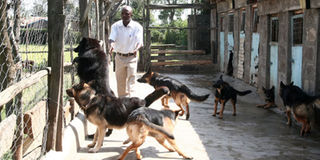Now a dog master, he sold two chickens to look for a job

Dog master Martin Chitechi at his kennels in Stem estate in Nakuru. When he left for Nairobi in 1996 in a desperate search for a job, little did he know that he would one day become an accomplished dog trainer and master. PHOTO | SULEIMAN MBATIAH | NATION MEDIA GROUP
What you need to know:
- He sold his two chickens in 1996 for Sh250 and raised enough money to travel to Nairobi.
- Chitechi got a job at a construction site but was dismissed after he was unable to carry stones up a building.
- He later got a job as a as a kennel attendant in Riverside, Nairobi.
- Here he learnt the art of handling dogs.
- He now works as a dog master with a Nakuru-based security firm.
When Martin Chitechi left his village for Nairobi to seek for a job, little did he know that he would end up being a leading dog master.
He sold his two chickens in 1996 for Sh250 and raised enough money to travel to Nairobi hoping against hope that he would get a job.
While at school, Chitechi had always dreamt of being a driver.
But he could not raise the amount of money that was required for him to pursue the career of his dreams.
He now is a master of over 40 dogs at a security firm in Nakuru.
Chitechi has also trained over 50 dog handlers some of whom work under him while others are in security firms across the country.
He does the same at Nakuru’s Stem estate where he is employed as a dog master and trainer by Robinson Security Firm where he heads the dog department.
Every morning, his day starts with finding out the status of all dogs that were on night assignment.
DOGS' WELL-BEING
“I call all the handlers to know if the dogs are okay, then I head to Stem where I oversee the well-being of the adult dogs as well as the puppies,” he said.
He then organises for the feeding as well as grooming of all the dogs, just to be sure they are energetic, healthy and clean.
His work entails managing the firm’s dogs in various parts of the country including Nakuru, Mombasa, Naivasha and Kisumu.

Martin Chitechi's work entails managing the firm’s dogs in Nakuru, Mombasa, Naivasha and Kisumu.
But his journey to being a master of man’s best friend was not easy.
“I went to live with my cousin at Kibera slums but they told me that I had to get a job because life in Nairobi was very expensive,” said Chitechi.
On his second day in the city, he was taken to a construction site where he was to carry stones.
He was challenged to carry a construction stone to the third floor of the building which was under construction.
“The stone fell, yet I had already taken porridge and chapatti on credit, hoping to pay after earning the day’s pay” he said
It was after he was unable to perform his tasks at the construction site that he decided to look for another job.
KENNEL ATTENDANT
The only job he got was as a kennel attendant with a dog breeder in Nairobi’s Riverside estate.
Though he had never interacted with man’s best friend, Chitechi had little choice as he had to eke out a living in the city.
The father of five would handle dogs at his new workplace which doubled as a pet’s clinic.
Though he was often disturbed by the stench that came from the dogs’ waste, he knew he had to work hard in order to survive in the city.
It was while here that he mastered the art of not only attending to, but also commanding and training dogs particularly German Shepherds, something he does to date.
German Shepherds are highly respected for their intelligence, loyalty and ability to control their temperaments.
This has made them a common preference for many security companies as well as households.
“But it is rare to get people who can handle them especially in large numbers,” said Mr Jim Chege, the MD at Robinson Security Company.
He described Martin as a hardworking person and a go-getter.

Martin dreams of starting his own dog firm and create employment for jobless youth.
GOOD INCOME
Though he declined to disclose how much he earns as a dogs master, Chitechi said his current income is more than five times what he earned on his first job as a kennel attendant.
Chitechi says he is often disturbed by the increasing number of people who opt for alcoholism and crime and blame it on joblessness.
He advises the young people to take up any job adding that it would not matter how they earned their money as long it was through legally acceptable means.
Said he, “After all, my pay cheque does not read ‘dogs’ but has as much value as if I would have done any other job that people consider as decent and respectable.”
Though he always wished to manage vehicles, Chitechi says he is proud managing dogs and takes it as a great job.
He dreams of starting his own dog firm where he would breed and sell puppies as a way create employment for other youth who may not have money to pursue higher education.





